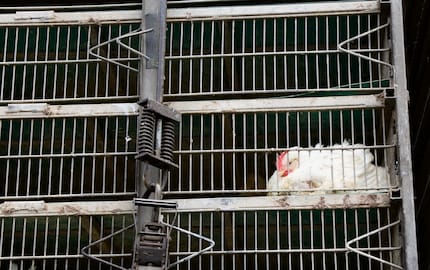
Guide
Animal in the law: Bitten by a dog - what you need to know
by Darina Schweizer

Many people hesitate when they suspect animal cruelty. When and how should you take action? If in doubt, it is better to report too much than too little.
A supermarket car park in Ticino. It's summer and I want to get an ice cream. As I pass a car, I hear excited barking and see a cocker spaniel. The windscreen is down and the dog seems lively, but an uneasy feeling creeps over me. What if the master or mistress returns too late?
I stand still and wait. Minutes pass, my nervousness increases. My gaze wanders to a stone in a flower bed. No, I can't do that, can I? Should I inform the supermarket staff and have the person paged? At that moment, a man approaches hastily and reassures his dog (and me) with the words: "It's all right, I hurried". I breathe a sigh of relief. But what would I have done in an emergency?
Marie-Lou Laissue, legal researcher at the Foundation for Animals in the Law, knows all about it.
Marie-Lou Laissue, is it legal to smash a car window without consent when a dog is locked up in summer, or to free a guinea pig from an enclosure that is too small?
This is only permitted if there is no other way to help the animal. The rescuer must be able to show that milder measures did not help or that there was no time to do so.
Then the guinea pig should not be rescued, but the dog should be?
Exactly, an enclosure that is too small is not an acute emergency. For a dog in a car, it depends on the situation: If it is not immediately in danger, the owner or the police should be notified first. However, if the dog is already unconscious or in danger of serious harm, the windscreen can and should be smashed immediately.
How often does cruelty to animals occur in Switzerland?
Animal cruelty is probably much more common than is reported. According to our latest figures, there were just 751 convictions in 2021. By comparison, there were over half a million dogs living in Switzerland at the time. Nevertheless, the number of convictions is steadily increasing.
How is this to be understood?
This shows that the Animal Welfare Act is being better enforced.
Which animals are most frequently victimised?
Dogs are by far the most frequent victims of animal welfare violations recorded in the statistics - most recently in 43 per cent of cases. However, as there are significantly more farm animals in Switzerland, chickens, cattle and pigs are probably the most frequently affected animals.
Why is the number of dogs so high after all?
One of the many reasons is that dogs are in public spaces and animal cruelty can therefore be observed more frequently.
What are the most common acts of cruelty to animals?
Neglect. This is committed by anyone who does not take care of their pet's needs or does so inadequately - for example by not giving it veterinary care or feeding it inadequately.
Is this not already considered mistreatment?
Only as soon as the animal is subjected to a certain level of stress.
What legal consequences do I face if I watch or like a social media video in which animals have been tortured?
Consumption can result in a prison sentence of up to one year or a fine. This also includes videos that show sexual acts with animals. The law does not explicitly prohibit liking or sharing such articles - but a penalty is still conceivable.
Is a suspicion investigated even without evidence such as photos?
Only if there is concrete evidence. It is therefore important to collect as much evidence as possible in advance and submit it together with the animal welfare report or complaint.
What is the approximate penalty for cruelty to animals?
In theory, animal cruelty can be punished with a prison sentence of up to three years and a fine of up to 180 daily rates. However, this is not utilised in practice. In 2021, for example, only one prison sentence was handed down. It amounted to seven months. Conditional fines were imposed most frequently.
This means that these only have to be paid if you do not comply with the probation conditions. Why aren't the penalties higher?
Many law enforcement and judicial authorities only attach secondary importance to animal welfare offences. This often leads to incomplete criminal investigations - and consequently to disproportionately low penalties. Another reason is that there is an inequality of arms: the accused is often represented by a lawyer, while the injured animal has no actual party representative.
Can a person in Switzerland who has been found guilty of cruelty to animals keep animals again?As a rule, yes. A ban on keeping animals is only imposed in particularly serious cases.
I love anything with four legs or roots - especially my shelter cats Jasper and Joy and my collection of succulents. My favourite things to do are stalking around with police dogs and cat coiffeurs on reportages or letting sensitive stories flourish in garden brockis and Japanese gardens.
Practical solutions for everyday problems with technology, household hacks and much more.
Show all
20 products are on offer, but who will buy them at the lowest price? Only the first to bid will win.






Ariel Universal+
72 Washing cycles, Washing powder